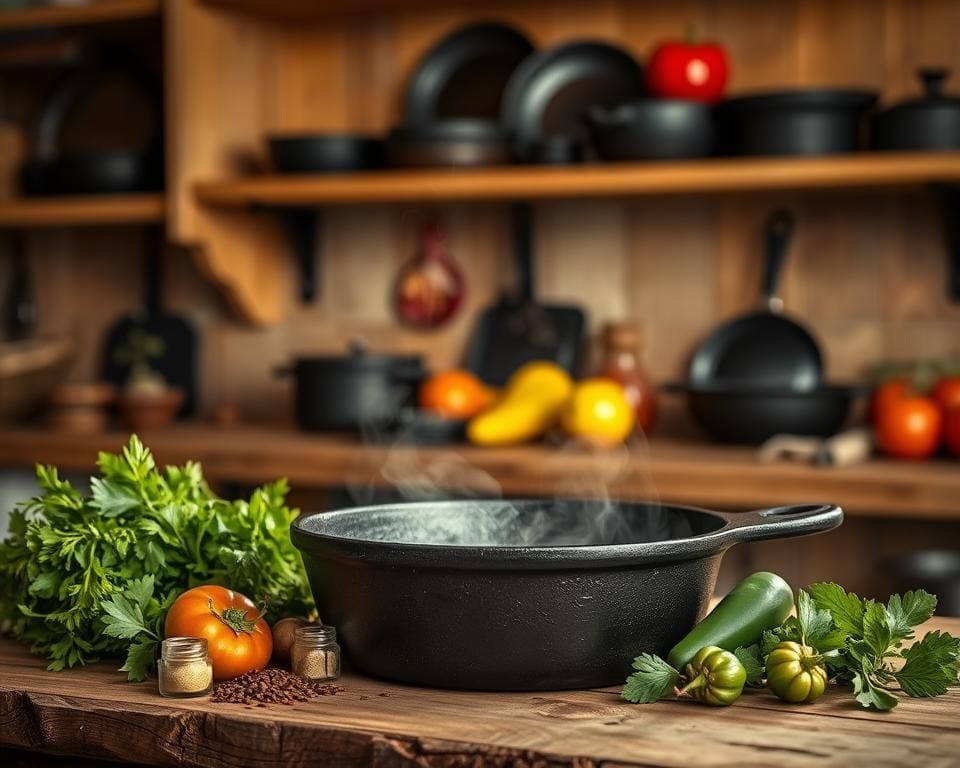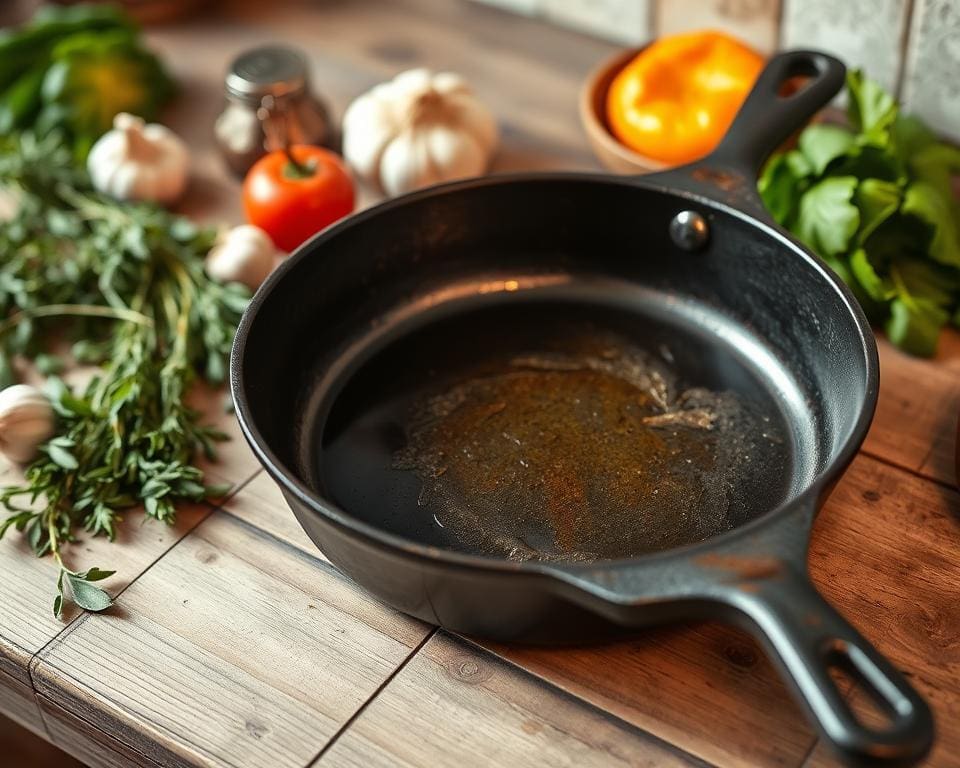Maintaining your cast iron cookware is not merely a chore; it is a commitment that allows you to enjoy the durability and versatility of these timeless pieces in your kitchen. To understand how to maintain your cast iron cookware, one must appreciate the potential lifespan of these skillets and pots, which can last for generations if cared for properly. Adopting essential cast iron care tips ensures that your cooking vessels continue to provide excellent heat retention and even cooking, enhancing your culinary experience.
By embracing a few foundational practices, you set the stage for a lifetime of delicious meals and memories. This section will enlighten you on the importance of maintaining your cast iron skillets, so you can preserve their unique qualities and enjoy their benefits for years to come.
Understanding the Importance of Cast Iron Care
Cast iron cookware is known for its durability and exceptional cooking capabilities. Understanding the importance of cast iron care is fundamental to preserving these benefits and extending the lifespan of your treasured pots and pans. Proper maintenance not only prevents rust and degradation but also enhances the non-stick surface that makes cooking delightful.
Why Proper Maintenance Matters
Neglecting your cast iron skillets can result in a host of problems. Without the right attention, the beautiful, seasoned finish can deteriorate. This can lead to unsightly rust and a loss of flavour-enhancing properties, making your cooking less enjoyable. Maintaining your cast iron cookware ensures that it continues to deliver delicious meals and sustains its performance for years to come.
Benefits of Cast Iron Cookware
The advantages of using cast iron cookware are numerous. It provides a chemical-free cooking surface that is safe for you and your family, promoting healthier meal preparation. In addition to being eco-friendly, cast iron is remarkably cost-effective due to its longevity. As you learn how to maintain your cast iron cookware, you will appreciate its ability to improve with age, making every meal a testament to both tradition and sustainability.

How to Maintain Your Cast Iron Cookware
Proper maintenance of cast iron cookware is essential for prolonging its life and enhancing its performance. To ensure your cookware remains in pristine condition, it is vital to follow practical maintenance procedures and embrace useful daily care tips.
Essential Maintenance Steps
Establishing a routine for cast iron care is important. Start with cleaning the cookware immediately after use to prevent food residue from hardening. Avoid soap and abrasive scrubbers, which can damage the seasoning. Instead, use a gentle scrubbing tool if needed. Once cleaned, immediate drying is crucial to prevent rust from forming. Applying a light coat of oil afterwards will help maintain the seasoning. These essential maintenance steps will keep your cast iron items functioning effectively.
Daily Care Tips
Implementing daily care tips can significantly enhance the longevity of your cast iron cookware. Use the right utensils—wooden or silicone ones work best—to avoid scratching the surface. Limit the use of cooking fats to prevent build-up. Storing cast iron in a moisture-free environment is essential; consider placing a paper towel inside to absorb any excess humidity. Integrating these cast iron care tips into your routine will ensure that your cookware remains reliable and ready for delicious meals.
Cast Iron Seasoning Guide
Understanding the process of seasoning is essential for maintaining the integrity of your cast iron cookware. Seasoning not only creates a protective layer but also enhances the cooking experience by providing a natural non-stick surface. Here, we will explore what is seasoning and share effective strategies on how to season your cast iron.
What is Seasoning?
Seasoning refers to the treatment of cast iron cookware with oils to form a durable, protective coating. This process involves heating the cookware with a layer of oil, which undergoes a transformation through polymerisation, creating a hard, smooth surface. This non-stick layer prevents rust and enables easier cooking and cleanup.
How to Season Your Cast Iron
To ensure your cast iron remains in top condition, follow these steps in our cast iron seasoning guide:
- Clean your cookware: Start with a clean, dry pan. If necessary, scrub off any residue from previous cooking.
- Choose your oil: Use a suitable oil with a high smoke point, such as flaxseed oil, grapeseed oil, or vegetable oil.
- Apply the oil: Pour a small amount of oil into the pan and spread it evenly across the cooking surface and sides using a paper towel.
- Heat the oven: Preheat your oven to around 200-250°C (400-480°F).
- Bake your cookware: Place the cast iron upside down on the top rack and insert a baking tray on the bottom rack to catch any drips. Bake for at least an hour.
- Cool down: Turn off the oven, allowing the cookware to cool inside before removing it.
Regular seasoning is essential for maintaining your cast iron. By following these steps, you can enjoy the numerous benefits this resilient cookware offers.
Caring for Your Cast Iron Pots and Pans
Maintaining your cast iron cookware is a rewarding experience that can keep it performing beautifully for generations. By employing the right cleaning techniques, you can effectively remove food residues while preserving the essential seasoning that gives your pots and pans their iconic non-stick properties. Careful attention to cleaning methods will ensure that your investment remains in top shape.
Cleaning Techniques
When it comes to caring for your cast iron pots and pans, hot water is your best friend. After letting your cookware cool, rinse it with warm water and use a non-metal brush or sponge to dislodge any food particles. For tough residues, consider using a salt scrub; coarse salt acts as a gentle abrasive, effectively lifting stuck bits without harming the seasoning. Remember, harsh detergents should be avoided as they can strip away the seasoning, leaving your cookware vulnerable to rust.
Handling Stubborn Stains
For particularly stubborn stains or baked-on food, a little extra effort may be required. Soaking your cookware in warm, soapy water for a short period can help loosen debris, but it should be followed by immediate drying to prevent rusting. If you discover light rust spots, a simple scrub with a fine steel wool pad can revive your cast iron. In the long run, regular maintenance and preventive measures are key to reducing the frequency of intensive cleaning sessions, allowing you to enjoy the culinary benefits of your cast iron for years to come.









